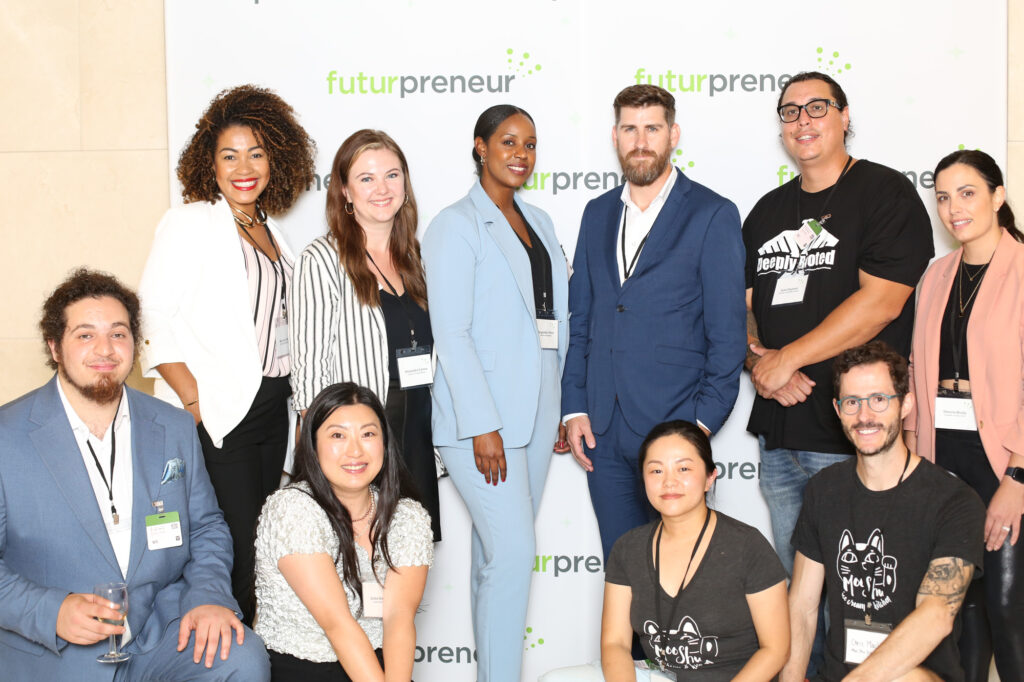
- Entrepreneurship
E04: On Belonging and Taking Space with Alfred Burgesson
Tune into our new podcast, Startup + Prosper! Our podcast is dedicated to the key elements of the entrepreneurial mindset, with a particular focus on the current state of Black entrepreneurship in Canada. Each of the episodes aims to inspire and educate listeners about Black-owned businesses and their reality while providing more insight into Futurpreneur’s goals to grow, learn and help address the disparities faced by the BIPOC entrepreneurial community. Read their stories, listen and subscribe to our podcast, Startup + Prosper:
E04: On Belonging and Taking Space with Alfred Burgesson
Alfred Burgesson hasn’t always felt as though he belonged. When he was six years old, he left Ghana with his family to settle in Canada: “I moved to a town called Port Hawkesbury in Nova Scotia, with a population of 4,000 people. And it’s not very diverse,” he recalls.
By then, the experience was already prompting some essential questions. “I feel like from a young age, I was always looking for—I was always looking for a sense of community and like, who are my people here, who can I relate to?”
Finding your Kind
Decades later, not only did Alfred take up the space that he was due—he made sure to bring along everybody who looked like him and their talents. In 2020, he founded Tribe Network, connecting Black, Indigenous and People of Colour pursuing entrepreneurship and innovation with opportunities and each other. “Tribe Network came from my personal experience and from listening to the experience of other entrepreneurs. The organization is set out to be the BIPOC entrepreneurship hub in Canada,” he tells us.
Burgesson got an early start in entrepreneurship through an after-school program called Junior Achievement, where students come together with their peers to build a company. “I had a core group of people I was working with, and together, we were able to take up space,” explains the founder. “Entrepreneurship is about finding like-minded people who care about the problem you’re trying to solve. And together, you can take up space and create community,”, which is the mindset he carries with him still to this day.
Now, Tribe Network offers a space where entrepreneurs can support each other, which, in the eyes of the founder, is crucial. “You know, if I’m dealing with an issue, when I talk to an entrepreneur who’s already dealt with that, they’re able to give me direct feedback on how I can solve that issue, from their lived experience. So I think it’s really important that entrepreneurs surround themselves in a community where they belong.”
The idea for the network sprouted in the summer of 2020 through discussions between Alfred and his sister, who is an entrepreneur herself. The aim was to help build capacity for entrepreneurs and intrapreneurs and centralize that information. “The core of our conversation was—how can we give Black entrepreneurs a platform where they can sell their products and services to the world? How can we create a community where they can connect and learn from each other? How do we create a sense of belonging and community during COVID and lockdowns?”
Coaching, advising and mentoring are great ways to be supported, which you can access through Tribe. “I would encourage you to identify people who can support your entrepreneurial journey. But the crucial thing is that they believe in the problem you’re trying to solve, and that they believe in you.”
The Power of Data
Before launching his latest venture, Alfred Burgesson, an alumni of the Prime Minister’s Youth Council, was the co-chair of Canada’s first State of youth report.
He was also project lead at the African Canadian Senate group and the office of Senator Colin Deacon, a project aiming to dive deeper into the gaps for Black entrepreneurs in Canada. There, he was given the opportunity to study the problem he was initially exploring, gathering insight about the current state of Black entrepreneurship.
“The data that we collected definitely shed light on the state of Black entrepreneurs,” says the founder.
Information and numbers pertaining to BIPOC communities have historically been absent and underreported. “Fortunately or unfortunately, I think we are operating in a society and a system that often requires data to inform decisions,” says Burgesson. And when there’s data, there’s proof. Surveying has also allowed Black entrepreneurs to share their experiences and voice their concerns to governments.
“Through my work with the Senate, I realized that there were gaps in the entrepreneurship and innovation ecosystem. And the gaps had to do with entrepreneurs not being BIPOC, and not being connected with each other across the country,” says Burgesson. Furthermore, the entrepreneur states that his fellow BIPOC colleagues were not being connected to accelerators or incubators, which he is set on changing.
Turns out that these programs also need to be more representative of the population. “If they want more Black entrepreneurs, they need to have Black staff, coaches, mentors, plus language and resources that are tailored towards Black entrepreneurs,” Burgesson indicates.
Taking Up Space
Despite being an active entrepreneur for most of his life, Alfred Burgesson has felt at times that he was going through it alone. “Sometimes it’s challenging for entrepreneurs to walk into white spaces and thrive in them,” he says.
And it takes guts to get started and to keep at it. “It’s not an easy thing, and you need to have a lot of courage to succeed in entrepreneurship. So I think a part of that mindset is being able to walk in spaces where you’ll be the only one,” he says, speaking from experience.
And the burden shouldn’t only be ours to carry. “If an organization is going to make a commitment to being more diverse, I think it’s important that the team take a step back to recognize either the knowledge or lack of knowledge they have. It’s important to build capacity in the existing team to be able to support this new person or new people who are coming into your workplace,” pleads Burgersson. And we are talking about ongoing efforts, not a simple warm welcome. “You need to acknowledge and create the journey that will allow the entire staff to get better educated on how to support the community, not just the person coming in.”
For more perspective on breaking the glass ceiling, you can listen to the podcast episode “Taking Up Space: You belong!” with Alfred Burgersson.
This article was written by Christelle Saint-Julien










